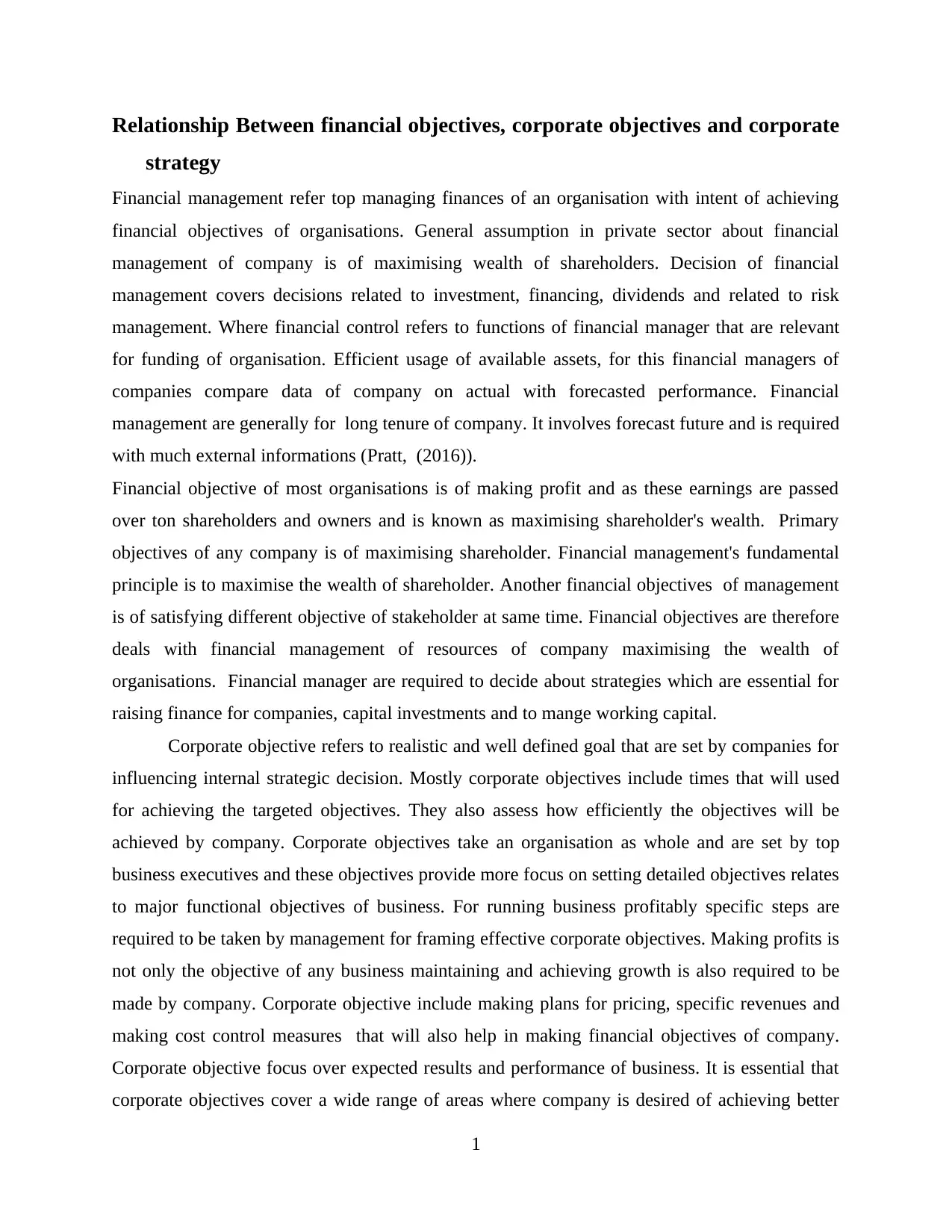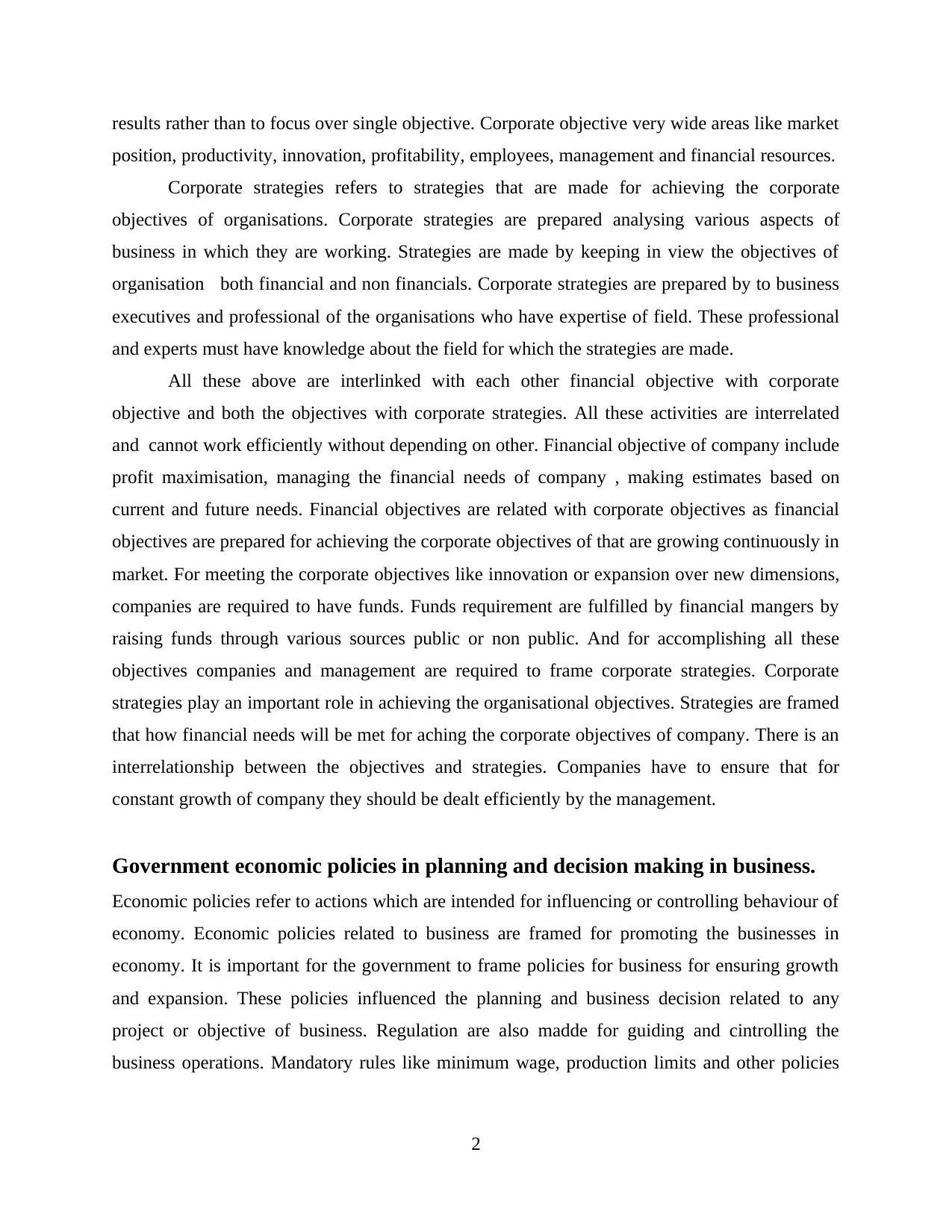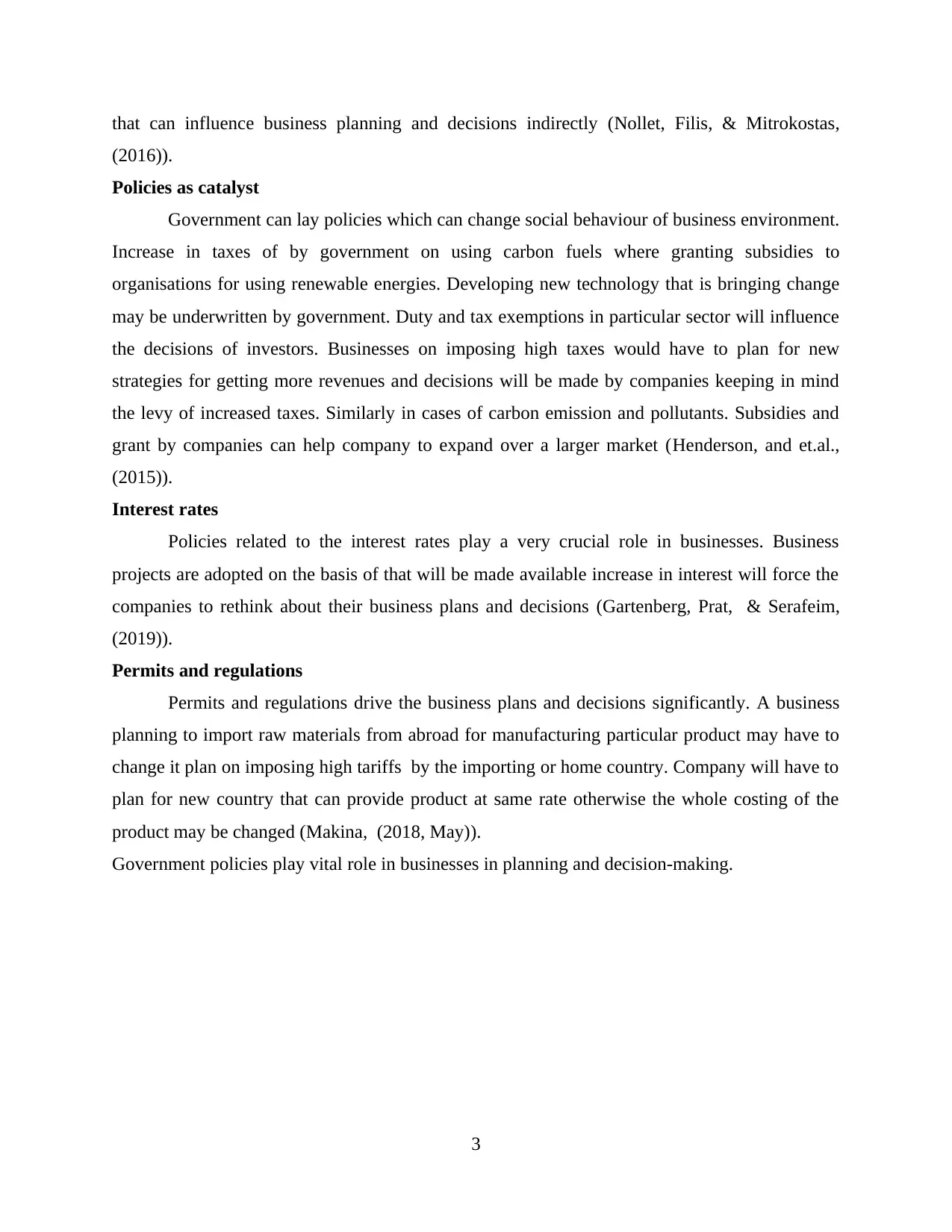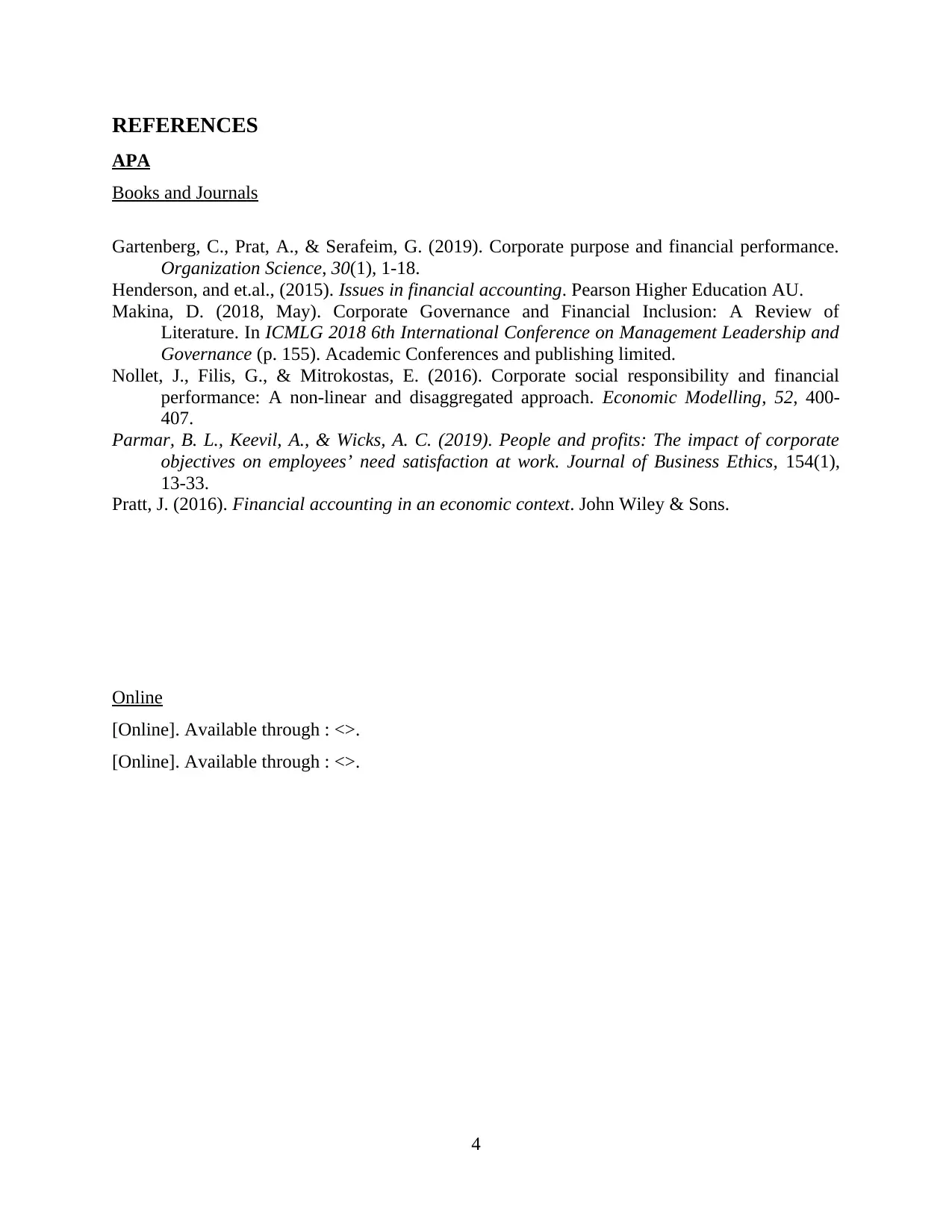Financial Objectives, Corporate Strategies, and Economic Policies
VerifiedAdded on 2021/02/21
|6
|1381
|22
Report
AI Summary
This report delves into the intricate relationship between financial objectives, corporate objectives, and corporate strategies within the context of financial management. It highlights the primary objective of maximizing shareholder wealth and explores the key financial decisions related to investment, financing, and risk management. The report examines how financial objectives align with corporate objectives, emphasizing the importance of profit maximization and sustainable growth. Furthermore, it analyzes the influence of government economic policies on business planning and decision-making, including regulations, interest rates, and tax policies. The report provides insights into how these factors impact businesses and their strategic approaches. The report also contains references from books and journals such as, Gartenberg, C., Prat, A., & Serafeim, G. (2019). Corporate purpose and financial performance. Organization Science, 30(1), 1-18. and Henderson, and et.al., (2015). Issues in financial accounting. Pearson Higher Education AU.

FINANCIAL
MANAGEMENT
MANAGEMENT
Paraphrase This Document
Need a fresh take? Get an instant paraphrase of this document with our AI Paraphraser

TABLE OF CONTENTS
Relationship Between financial objectives, corporate objectives and corporate strategy...............1
Government economic policies in planning and decision making in business. ..............................2
REFERENCES................................................................................................................................4
Relationship Between financial objectives, corporate objectives and corporate strategy...............1
Government economic policies in planning and decision making in business. ..............................2
REFERENCES................................................................................................................................4

Relationship Between financial objectives, corporate objectives and corporate
strategy
Financial management refer top managing finances of an organisation with intent of achieving
financial objectives of organisations. General assumption in private sector about financial
management of company is of maximising wealth of shareholders. Decision of financial
management covers decisions related to investment, financing, dividends and related to risk
management. Where financial control refers to functions of financial manager that are relevant
for funding of organisation. Efficient usage of available assets, for this financial managers of
companies compare data of company on actual with forecasted performance. Financial
management are generally for long tenure of company. It involves forecast future and is required
with much external informations (Pratt, (2016)).
Financial objective of most organisations is of making profit and as these earnings are passed
over ton shareholders and owners and is known as maximising shareholder's wealth. Primary
objectives of any company is of maximising shareholder. Financial management's fundamental
principle is to maximise the wealth of shareholder. Another financial objectives of management
is of satisfying different objective of stakeholder at same time. Financial objectives are therefore
deals with financial management of resources of company maximising the wealth of
organisations. Financial manager are required to decide about strategies which are essential for
raising finance for companies, capital investments and to mange working capital.
Corporate objective refers to realistic and well defined goal that are set by companies for
influencing internal strategic decision. Mostly corporate objectives include times that will used
for achieving the targeted objectives. They also assess how efficiently the objectives will be
achieved by company. Corporate objectives take an organisation as whole and are set by top
business executives and these objectives provide more focus on setting detailed objectives relates
to major functional objectives of business. For running business profitably specific steps are
required to be taken by management for framing effective corporate objectives. Making profits is
not only the objective of any business maintaining and achieving growth is also required to be
made by company. Corporate objective include making plans for pricing, specific revenues and
making cost control measures that will also help in making financial objectives of company.
Corporate objective focus over expected results and performance of business. It is essential that
corporate objectives cover a wide range of areas where company is desired of achieving better
1
strategy
Financial management refer top managing finances of an organisation with intent of achieving
financial objectives of organisations. General assumption in private sector about financial
management of company is of maximising wealth of shareholders. Decision of financial
management covers decisions related to investment, financing, dividends and related to risk
management. Where financial control refers to functions of financial manager that are relevant
for funding of organisation. Efficient usage of available assets, for this financial managers of
companies compare data of company on actual with forecasted performance. Financial
management are generally for long tenure of company. It involves forecast future and is required
with much external informations (Pratt, (2016)).
Financial objective of most organisations is of making profit and as these earnings are passed
over ton shareholders and owners and is known as maximising shareholder's wealth. Primary
objectives of any company is of maximising shareholder. Financial management's fundamental
principle is to maximise the wealth of shareholder. Another financial objectives of management
is of satisfying different objective of stakeholder at same time. Financial objectives are therefore
deals with financial management of resources of company maximising the wealth of
organisations. Financial manager are required to decide about strategies which are essential for
raising finance for companies, capital investments and to mange working capital.
Corporate objective refers to realistic and well defined goal that are set by companies for
influencing internal strategic decision. Mostly corporate objectives include times that will used
for achieving the targeted objectives. They also assess how efficiently the objectives will be
achieved by company. Corporate objectives take an organisation as whole and are set by top
business executives and these objectives provide more focus on setting detailed objectives relates
to major functional objectives of business. For running business profitably specific steps are
required to be taken by management for framing effective corporate objectives. Making profits is
not only the objective of any business maintaining and achieving growth is also required to be
made by company. Corporate objective include making plans for pricing, specific revenues and
making cost control measures that will also help in making financial objectives of company.
Corporate objective focus over expected results and performance of business. It is essential that
corporate objectives cover a wide range of areas where company is desired of achieving better
1
⊘ This is a preview!⊘
Do you want full access?
Subscribe today to unlock all pages.

Trusted by 1+ million students worldwide

results rather than to focus over single objective. Corporate objective very wide areas like market
position, productivity, innovation, profitability, employees, management and financial resources.
Corporate strategies refers to strategies that are made for achieving the corporate
objectives of organisations. Corporate strategies are prepared analysing various aspects of
business in which they are working. Strategies are made by keeping in view the objectives of
organisation both financial and non financials. Corporate strategies are prepared by to business
executives and professional of the organisations who have expertise of field. These professional
and experts must have knowledge about the field for which the strategies are made.
All these above are interlinked with each other financial objective with corporate
objective and both the objectives with corporate strategies. All these activities are interrelated
and cannot work efficiently without depending on other. Financial objective of company include
profit maximisation, managing the financial needs of company , making estimates based on
current and future needs. Financial objectives are related with corporate objectives as financial
objectives are prepared for achieving the corporate objectives of that are growing continuously in
market. For meeting the corporate objectives like innovation or expansion over new dimensions,
companies are required to have funds. Funds requirement are fulfilled by financial mangers by
raising funds through various sources public or non public. And for accomplishing all these
objectives companies and management are required to frame corporate strategies. Corporate
strategies play an important role in achieving the organisational objectives. Strategies are framed
that how financial needs will be met for aching the corporate objectives of company. There is an
interrelationship between the objectives and strategies. Companies have to ensure that for
constant growth of company they should be dealt efficiently by the management.
Government economic policies in planning and decision making in business.
Economic policies refer to actions which are intended for influencing or controlling behaviour of
economy. Economic policies related to business are framed for promoting the businesses in
economy. It is important for the government to frame policies for business for ensuring growth
and expansion. These policies influenced the planning and business decision related to any
project or objective of business. Regulation are also madde for guiding and cintrolling the
business operations. Mandatory rules like minimum wage, production limits and other policies
2
position, productivity, innovation, profitability, employees, management and financial resources.
Corporate strategies refers to strategies that are made for achieving the corporate
objectives of organisations. Corporate strategies are prepared analysing various aspects of
business in which they are working. Strategies are made by keeping in view the objectives of
organisation both financial and non financials. Corporate strategies are prepared by to business
executives and professional of the organisations who have expertise of field. These professional
and experts must have knowledge about the field for which the strategies are made.
All these above are interlinked with each other financial objective with corporate
objective and both the objectives with corporate strategies. All these activities are interrelated
and cannot work efficiently without depending on other. Financial objective of company include
profit maximisation, managing the financial needs of company , making estimates based on
current and future needs. Financial objectives are related with corporate objectives as financial
objectives are prepared for achieving the corporate objectives of that are growing continuously in
market. For meeting the corporate objectives like innovation or expansion over new dimensions,
companies are required to have funds. Funds requirement are fulfilled by financial mangers by
raising funds through various sources public or non public. And for accomplishing all these
objectives companies and management are required to frame corporate strategies. Corporate
strategies play an important role in achieving the organisational objectives. Strategies are framed
that how financial needs will be met for aching the corporate objectives of company. There is an
interrelationship between the objectives and strategies. Companies have to ensure that for
constant growth of company they should be dealt efficiently by the management.
Government economic policies in planning and decision making in business.
Economic policies refer to actions which are intended for influencing or controlling behaviour of
economy. Economic policies related to business are framed for promoting the businesses in
economy. It is important for the government to frame policies for business for ensuring growth
and expansion. These policies influenced the planning and business decision related to any
project or objective of business. Regulation are also madde for guiding and cintrolling the
business operations. Mandatory rules like minimum wage, production limits and other policies
2
Paraphrase This Document
Need a fresh take? Get an instant paraphrase of this document with our AI Paraphraser

that can influence business planning and decisions indirectly (Nollet, Filis, & Mitrokostas,
(2016)).
Policies as catalyst
Government can lay policies which can change social behaviour of business environment.
Increase in taxes of by government on using carbon fuels where granting subsidies to
organisations for using renewable energies. Developing new technology that is bringing change
may be underwritten by government. Duty and tax exemptions in particular sector will influence
the decisions of investors. Businesses on imposing high taxes would have to plan for new
strategies for getting more revenues and decisions will be made by companies keeping in mind
the levy of increased taxes. Similarly in cases of carbon emission and pollutants. Subsidies and
grant by companies can help company to expand over a larger market (Henderson, and et.al.,
(2015)).
Interest rates
Policies related to the interest rates play a very crucial role in businesses. Business
projects are adopted on the basis of that will be made available increase in interest will force the
companies to rethink about their business plans and decisions (Gartenberg, Prat, & Serafeim,
(2019)).
Permits and regulations
Permits and regulations drive the business plans and decisions significantly. A business
planning to import raw materials from abroad for manufacturing particular product may have to
change it plan on imposing high tariffs by the importing or home country. Company will have to
plan for new country that can provide product at same rate otherwise the whole costing of the
product may be changed (Makina, (2018, May)).
Government policies play vital role in businesses in planning and decision-making.
3
(2016)).
Policies as catalyst
Government can lay policies which can change social behaviour of business environment.
Increase in taxes of by government on using carbon fuels where granting subsidies to
organisations for using renewable energies. Developing new technology that is bringing change
may be underwritten by government. Duty and tax exemptions in particular sector will influence
the decisions of investors. Businesses on imposing high taxes would have to plan for new
strategies for getting more revenues and decisions will be made by companies keeping in mind
the levy of increased taxes. Similarly in cases of carbon emission and pollutants. Subsidies and
grant by companies can help company to expand over a larger market (Henderson, and et.al.,
(2015)).
Interest rates
Policies related to the interest rates play a very crucial role in businesses. Business
projects are adopted on the basis of that will be made available increase in interest will force the
companies to rethink about their business plans and decisions (Gartenberg, Prat, & Serafeim,
(2019)).
Permits and regulations
Permits and regulations drive the business plans and decisions significantly. A business
planning to import raw materials from abroad for manufacturing particular product may have to
change it plan on imposing high tariffs by the importing or home country. Company will have to
plan for new country that can provide product at same rate otherwise the whole costing of the
product may be changed (Makina, (2018, May)).
Government policies play vital role in businesses in planning and decision-making.
3

REFERENCES
APA
Books and Journals
Gartenberg, C., Prat, A., & Serafeim, G. (2019). Corporate purpose and financial performance.
Organization Science, 30(1), 1-18.
Henderson, and et.al., (2015). Issues in financial accounting. Pearson Higher Education AU.
Makina, D. (2018, May). Corporate Governance and Financial Inclusion: A Review of
Literature. In ICMLG 2018 6th International Conference on Management Leadership and
Governance (p. 155). Academic Conferences and publishing limited.
Nollet, J., Filis, G., & Mitrokostas, E. (2016). Corporate social responsibility and financial
performance: A non-linear and disaggregated approach. Economic Modelling, 52, 400-
407.
Parmar, B. L., Keevil, A., & Wicks, A. C. (2019). People and profits: The impact of corporate
objectives on employees’ need satisfaction at work. Journal of Business Ethics, 154(1),
13-33.
Pratt, J. (2016). Financial accounting in an economic context. John Wiley & Sons.
Online
[Online]. Available through : <>.
[Online]. Available through : <>.
4
APA
Books and Journals
Gartenberg, C., Prat, A., & Serafeim, G. (2019). Corporate purpose and financial performance.
Organization Science, 30(1), 1-18.
Henderson, and et.al., (2015). Issues in financial accounting. Pearson Higher Education AU.
Makina, D. (2018, May). Corporate Governance and Financial Inclusion: A Review of
Literature. In ICMLG 2018 6th International Conference on Management Leadership and
Governance (p. 155). Academic Conferences and publishing limited.
Nollet, J., Filis, G., & Mitrokostas, E. (2016). Corporate social responsibility and financial
performance: A non-linear and disaggregated approach. Economic Modelling, 52, 400-
407.
Parmar, B. L., Keevil, A., & Wicks, A. C. (2019). People and profits: The impact of corporate
objectives on employees’ need satisfaction at work. Journal of Business Ethics, 154(1),
13-33.
Pratt, J. (2016). Financial accounting in an economic context. John Wiley & Sons.
Online
[Online]. Available through : <>.
[Online]. Available through : <>.
4
⊘ This is a preview!⊘
Do you want full access?
Subscribe today to unlock all pages.

Trusted by 1+ million students worldwide
1 out of 6
Related Documents
Your All-in-One AI-Powered Toolkit for Academic Success.
+13062052269
info@desklib.com
Available 24*7 on WhatsApp / Email
![[object Object]](/_next/static/media/star-bottom.7253800d.svg)
Unlock your academic potential
Copyright © 2020–2026 A2Z Services. All Rights Reserved. Developed and managed by ZUCOL.





